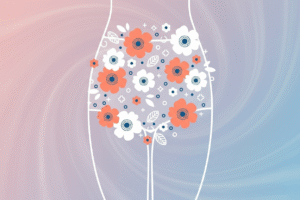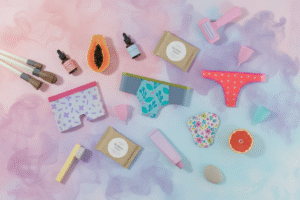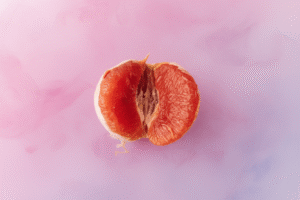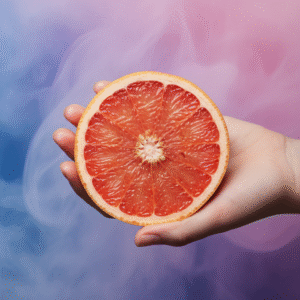Let’s get one thing straight from the start: vaginal health should never be a whispered conversation or something you Google at 2 AM in secret. It’s 2025, and we’re done with the shame, the myths, and the embarrassing silence around one of the most important aspects of women’s health. At Q+, we believe in celebrating and empowering every aspect of the LGBTQ+ lifestyle, and that absolutely includes honest, empowering conversations about vaginal health for all women, regardless of sexual orientation.

Whether you’re lesbian, bisexual, pansexual, or exploring your sexuality, understanding your body isn’t just important for health reasons but it’s also about reclaiming your power and embracing your authentic self. The world of vaginal health has evolved dramatically, and there are some fascinating facts that might surprise you. So grab your favorite beverage, get comfortable, and let’s dive into six things about vaginal health that will change how you think about and care for your body.
1. Your Vagina is Actually Self-Cleaning (And You’re Probably Overcleaning It)
Here’s something that might blow your mind: your vagina is like having the world’s most efficient cleaning service working 24/7. The vaginal ecosystem maintains its own delicate balance through a complex community of beneficial bacteria, primarily Lactobacillus species, that work tirelessly to keep things healthy and balanced.

This incredible microbiome produces lactic acid that maintains an optimal pH level between 3.5 and 4.5, creating an acidic environment that naturally protects against harmful bacteria and infections. Think of it as your body’s own personal security system that never takes a day off.
But here’s where many people go wrong: we keep interfering with this natural process. Those fancy feminine hygiene products, scented soaps, and douches that promise to make you “fresh and clean”? They’re actually disrupting this delicate balance and can lead to infections, irritation, and bacterial vaginosis. The billion-dollar feminine hygiene industry has convinced us that our natural bodies need fixing, but science tells us otherwise.
What should you do instead? Keep it simple. Warm water and a gentle, fragrance-free soap for the external vulvar area is all you need. Your vagina’s got the internal cleaning covered, and trust us, it’s better at its job than any product on the market.
2. Vaginal Discharge is Actually a Sign of Good Health
Let’s clear up one of the biggest misconceptions: vaginal discharge isn’t gross, abnormal, or something to be ashamed of. It’s actually a sign that your body is working exactly as it should. That discharge is your vagina’s way of flushing out old cells and harmful microbes, keeping your internal environment clean and protected.
Throughout your menstrual cycle, your discharge will naturally change in color, consistency, and amount, and this variation is completely normal. Around ovulation, you might notice it becomes clear and stretchy like egg whites (this is actually helping sperm reach an egg if you’re trying to conceive). After ovulation, it might become thicker or more opaque.
For LGBTQ+ women, understanding these natural changes is particularly important because traditional sex education often focuses on heteronormative reproductive health, leaving out crucial information about what’s normal for all women regardless of their sexual partners. These natural variations happen whether you’re sexually active with men, women, both, or neither.
The key is knowing when discharge might indicate a problem. If you notice a strong, fishy odor accompanied by unusual color (green or gray), itching, or burning, that could signal an infection requiring medical attention. But that normal, mild scent? That’s just your body being a body.
3. Your Vaginal Health Changes Dramatically Throughout Your Life
Here’s something fascinating that doesn’t get talked about enough: your vaginal health is constantly evolving, and understanding these changes can help you take better care of yourself at every life stage.

In your twenties and thirties, you’re likely experiencing your vagina’s peak years thanks to optimal levels of estrogen, progesterone, and testosterone. Your vaginal walls are thick and well-lubricated, your pH balance is stable, and infections are generally less common (assuming you’re practicing good hygiene habits).
As you approach perimenopause and menopause, estrogen levels begin to decline, leading to significant changes in vaginal health. The vaginal walls may become thinner and drier, the pH level can shift toward alkaline, and you might experience decreased lubrication. This can lead to discomfort during sexual activity and increased susceptibility to infections.
For transgender men on hormone therapy, these changes can happen regardless of age due to testosterone treatment suppressing estrogen production. Research from 2025 shows that the vaginal microbiome of transgender men receiving gender-affirming hormone therapy becomes similar to that of menopausal women, with reduced Lactobacilli and increased bacterial diversity.
Understanding these natural progressions helps normalize the changes and encourages proactive healthcare. Regular gynecological check-ups become even more important as you age, and there are effective treatments available to help manage symptoms and maintain sexual health.
4. Sexual Activity Doesn’t “Loosen” Your Vagina (But Other Things Do Affect It)
Let’s demolish one of the most harmful myths once and for all: frequent sexual activity does not make your vagina “loose.” This myth is rooted in misogyny and has caused unnecessary shame and anxiety for countless women.
The vagina is an incredibly elastic, muscular organ designed to expand dramatically (think childbirth) and then return to its original size. When you’re sexually aroused, blood flow increases to the area, the vaginal walls relax and lengthen, and natural lubrication increases to accommodate penetration comfortably. After sexual activity, everything returns to its normal state.

What does affect vaginal tone and elasticity? Age, childbirth, and hormonal changes. As estrogen levels decrease with age or hormone therapy, the vaginal tissues can become less elastic. Childbirth, particularly vaginal delivery, can temporarily or permanently change vaginal tone due to the stretching of pelvic floor muscles and surrounding tissues.
The solution isn’t shame or expensive “tightening” products. Pelvic floor exercises (Kegels) can help maintain muscle tone and improve sexual satisfaction. More importantly, communication with sexual partners about comfort, pleasure, and needs is far more valuable than worrying about outdated and harmful myths.
For women who have sex with women, this information is particularly relevant because dental dams, fingers, and toys come in various sizes, and understanding your body’s natural responses helps ensure comfortable and pleasurable experiences for everyone involved.
5. LGBTQ+ Women Face Unique Sexual Health Challenges
Here’s where Q+ is making a real difference: recognizing that LGBTQ+ women have specific health needs that have been historically ignored or misunderstood by traditional healthcare. Lesbian, bisexual, and queer women face unique challenges when it comes to sexual and vaginal health, and it’s time we address them head-on.
Sexually transmitted infections (STIs) can be transmitted between women through various forms of intimate contact, including vaginal-to-vaginal contact, manual-vaginal contact, oral sex, and sharing sex toys. Infections like bacterial vaginosis, yeast infections, HPV, herpes, chlamydia, and even HIV can be transmitted between female partners, yet many healthcare providers and even LGBTQ+ women themselves underestimate these risks.

The lack of inclusive sexual health education has created significant knowledge gaps. Many LGBTQ+ women report receiving inadequate information about safer sex practices, including the use of dental dams during oral sex, proper cleaning of sex toys, and the importance of regular STI testing regardless of partner gender.
Mental health also plays a crucial role in sexual and vaginal health for LGBTQ+ women. Research shows higher rates of depression, anxiety, and substance use in this community, often due to discrimination, family rejection, or social isolation. These mental health challenges can directly impact sexual satisfaction, libido, and overall vaginal health.
Q+ is revolutionizing this space by creating inclusive resources and safe spaces where LGBTQ+ women can access accurate, judgment-free information about their sexual health. We’re moving beyond the heteronormative assumptions that have dominated healthcare and creating content that celebrates and supports all expressions of female sexuality.
6. Your Gut Health Directly Impacts Your Vaginal Health
This might be the most surprising connection on our list: the health of your digestive system has a direct impact on your vaginal health. Both your gut and vagina are home to complex microbiomes, and when one gets out of balance, it can affect the other.
Research from 2025 has revealed fascinating connections between gut bacteria and vaginal health. When your gut microbiome is disrupted (perhaps due to antibiotics, poor diet, or stress), it can lead to an overgrowth of harmful bacteria that can migrate and cause vaginal infections. Similarly, recurrent vaginal infections can sometimes be traced back to an imbalanced gut microbiome.
This connection explains why some women experience recurring yeast infections or bacterial vaginosis despite following all the traditional advice. The solution often lies in supporting overall microbiome health through diet, probiotics, and lifestyle changes.
Foods rich in probiotics (like yogurt, kefir, and fermented vegetables) can help maintain healthy bacteria levels throughout your body. Prebiotic foods (like garlic, onions, and bananas) feed the beneficial bacteria. Reducing sugar intake, managing stress, and avoiding unnecessary antibiotics also support both gut and vaginal health.
For LGBTQ+ women who may already be managing stress related to identity, family acceptance, or discrimination, this gut-vagina connection becomes even more important to understand and address. Supporting overall wellness through nutrition, stress management, and community support can have profound effects on sexual and vaginal health.
How Q+ is Leading the Revolution in LGBTQ+ Health Education
What makes 2025 so exciting for vaginal health awareness is the emergence of platforms like Q+ that refuse to treat sexual health as an afterthought or taboo subject. We’re not just providing information; we’re creating a cultural shift toward celebration, empowerment, and inclusive healthcare.
Q+ recognizes that traditional healthcare has failed LGBTQ+ women by operating under heteronormative assumptions and failing to provide relevant, inclusive information. Our approach is revolutionary: instead of asking for acceptance or apologizing for our existence, we’re creating our own spaces where LGBTQ+ lifestyle and health are centered and celebrated.
Through comprehensive lifestyle platforms that include not just health education but also community spaces, boutique experiences, and cultural celebration, Q+ is demonstrating that sexual health is just one component of living authentically and fabulously. We’re connecting vaginal health to overall wellness, mental health, relationship dynamics, and personal empowerment.
The impact extends beyond individual health outcomes. By creating visible, positive representations of LGBTQ+ sexual health, Q+ is influencing broader cultural conversations and pushing healthcare providers to become more inclusive and informed. We’re training a generation of LGBTQ+ individuals to advocate for themselves, ask informed questions, and demand quality care.
The Future of Inclusive Sexual Health
As we move through 2025, the landscape of sexual health education and vaginal health awareness is rapidly evolving. The six facts we’ve explored represent just the beginning of a broader transformation in how we understand and discuss women’s sexual health.

The integration of technology, personalized medicine, and inclusive healthcare practices is creating new opportunities for education and treatment. Mobile apps can now track vaginal health symptoms and connect users with LGBTQ+-friendly healthcare providers. Telehealth services are making specialized care accessible to LGBTQ+ individuals in areas where local resources are limited.
Research is finally beginning to address the massive gaps in our understanding of LGBTQ+ sexual health. Studies on the vaginal microbiome of transgender men, the sexual health needs of bisexual women, and the unique risks faced by women who have sex with women are providing crucial data that will improve care for our entire community.
Most importantly, platforms like Q+ are proving that when LGBTQ+ individuals have access to accurate, relevant, and celebration-focused health information, they make better decisions, experience better health outcomes, and live more authentically empowered lives.
Your vaginal health matters. Your sexual satisfaction matters. Your questions deserve answers, your concerns deserve attention, and your pleasure deserves celebration. In 2025, we’re not just surviving; we’re thriving, and that includes every aspect of our sexual and reproductive health.
Join the Q+ community and be part of this revolutionary approach to LGBTQ+ health and lifestyle. Because when we know better, we do better, and when we celebrate ourselves authentically, everyone benefits.



